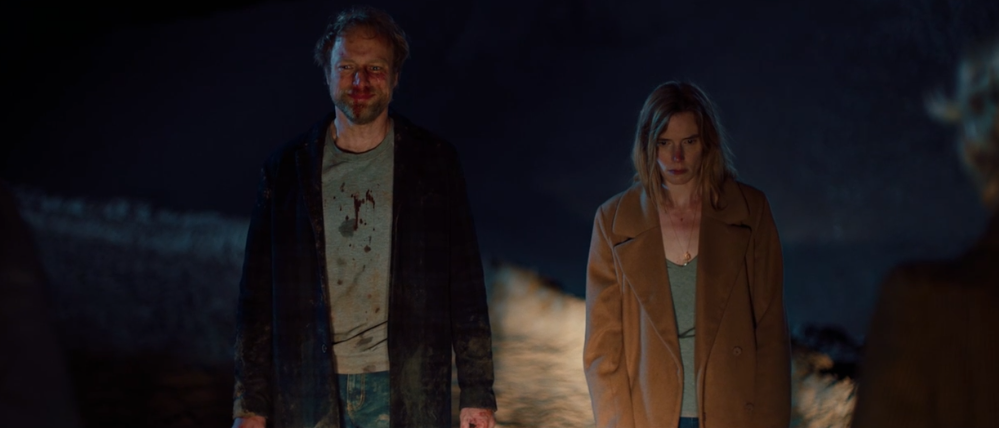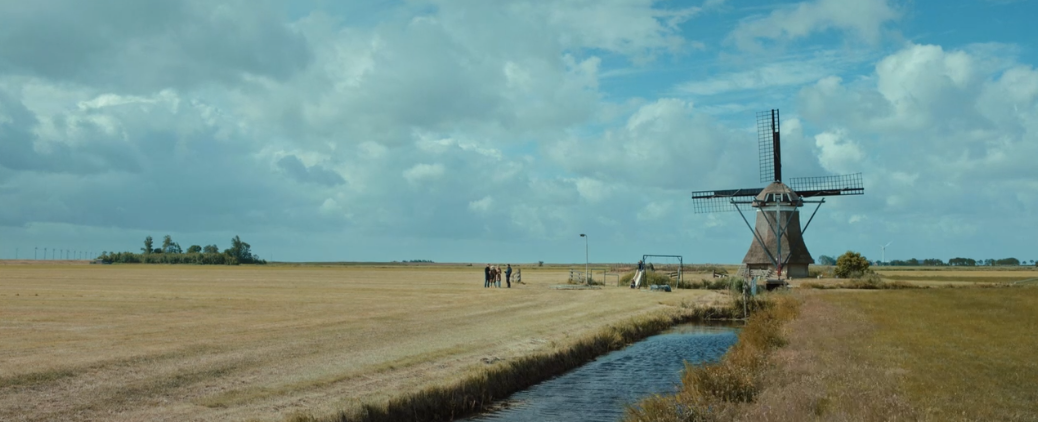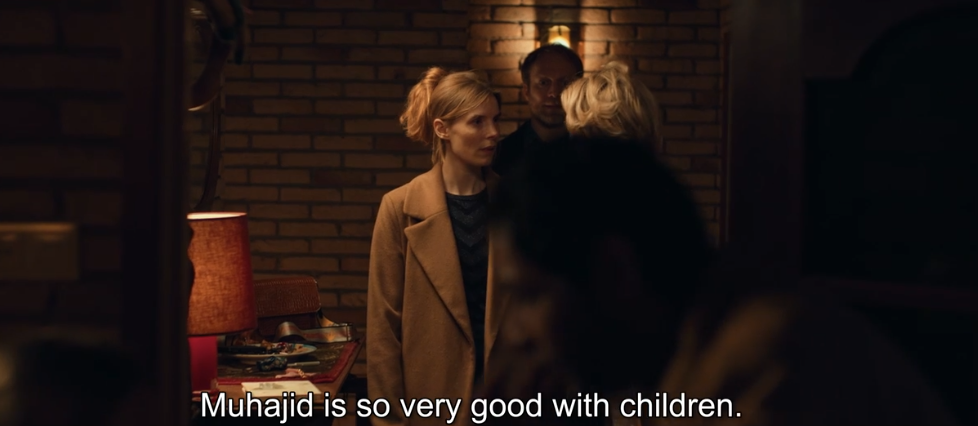Speak No Evil (2022)
September 18, 2022

Christian Tafdrup's Speak No Evil (Danish title: Gæsterne, "Guests") was released January 2022 to rave reviews and buckets of accolades. It was released on Shudder on September 15th and has caused quite a stir in just a few days. Reviews on Shudder and the horror communities on Reddit frequently include words like "raw," "unsettling," "a punch to the gut," "deeply uncomfortable," etc. So what is this movie?
Synopsis
Danish couple Bjørn and Louise are vacationing in Tuscany with their young daughter, Agnes, when they meet another family: Patrick, Karin, and their son Abel. The group become fast friends and make that common promise of vacation friends: "Of course we'll come visit you!" Months later Patrick and Karin unexpectedly try to make good on this and invite Bjørn and Louise to visit them in rural Holland. Despite their misgivings about spending an isolated weekend with people they barely know, they accept, not wanting to be rude. This desire to be polite and adhere to social norms sets events in motion which, spoiler alert: don't end well.
The soundtrack
They didn't have to make the soundtrack as bombastic and extra as a Hammer-era psychodrama, but it was one cool-ass choice. Sune Kølster composed some truly over-the-top pieces for this, but it's their placement that really makes them stand out. Dark, ominous instrumentation is laid over innocuous scenes like the family driving through a forest at night or walking through an idyllic meadow. It's got the same vibes as the horns blaring over the twisting road as the Torrence family is driving to the Overlook Hotel and it's very effective and unsettling.
The cinematography

Gorgeous. Natural light and low, ambient light sources abound.
The use of language
I'll talk more about this later on, but as someone who speaks neither Danish nor Dutch, this movie is simultaneously very interesting and somewhat frustrating. Language is used as something of a smokescreen; Each family has their own language (Danish for Bjørn, Louise, and Agnes, Dutch for Patrick, Karin, and Abel) with English serving as their shared tongue. Interestingly, there are subtitles for the Danish dialogue, but not for the Dutch, so unless you speak Dutch, you're just as in the dark as Bjørn and Louise. The movie never completely tips its hand with regard to whether Patrick and Karin understand Danish, but there's a few shots of smirks or knowing looks that I think are indications that Danish isn't the protective shield they think it is.
That said, Danish and Dutch are both Germanic languages, close in both ancestry and geography, and we do see that Louise understands at least a little bit of Dutch. Karin tells (not asks) Agnes to set the table for dinner, and while they are eating starts giving a few other commands to Agnes until Louise finally has enough and snaps at her to stop ordering her daughter around. At least one of these commands is about eating her vegetables, but unfortunately even these lines aren't translated for us. I don't know if the Dutch dialogue is actually meaningful but I assume it's all pretty innocuous. I'm sure there's plenty of Dutch speakers in Denmark, after all. It's likely that the Dutch dialogue adds another layer and carries some foreshadowing, but I don't feel like I was missing anything or out of the loop by not understanding it.
The characters
Morten Burian and Sidsel Siem Koch (Bjørn and Louise, respectively) both give wonderful performances as polite and well-meaning, yet ultimately somewhat empty and insincere, middle-class people living ordinary lives. Burian's Bjørn is a world-weary man, seemingly baffled by what his life has become. We're never told what he wanted his life to be; if he dreamt of moving to Tokyo, or being a pastry chef, or wandering the American Southwest, but we know he's deeply unsatisfied. He's a man who fell into the current that is the Life Script™ of Western society and has been carried so far by it that he's now in a world neither chosen nor recognized. He's tight, quiet, and stiff. In contrast, Patrick (Fedja van Huêt) is warm and open with his emotions, his masculinity carried with an easy swagger. He freely gives his opinions, unfettered by social norms, and he has a lively wife he can dance with at a bar (while making out and squeezing her butt!). When the two families are first dining together, Bjørn opines that the Danes have much more in common with the Dutch than their Nordic cousins when it comes to culture and their senses of humor. Patrick is extremely pleased to hear that, confessing that he'd found a Swedish coworker to be dreadfully boring and "too concerned with being politically correct." At first, this serves as a nice bonding moment for them, but like most of the dialogue in this movie, it's foreshadowing.
While the men are returning from the grocer, Bjørn tearfully confesses that he doesn't know how he ended up as just another husband and father. He's just A Guy, and this is not the life he wanted. Then, in a scene that I vaguely remember from Garden State, the two men bond over screaming into an empty landscape. They hang out in the hot tub, just Bein' Dudes (Louise spends the day...helping Karin with yardwork). It's not clear whether Bjørn actually envies Patrick, but it's clear he at least admires him.
Unfortunately, the women in this movie are given nowhere near this level of complexity. Sidsel Siem Koch gives a brilliant performance as a concerned, and later terrified, mother, but sadly she doesn't get much characterization beyond this and being another person for Patrick and Karin to disrespect. She's a vegetarian- well, a pescatarian- and is repeatedly served meat, and Patrick later rips into the hypocrisy of not seeing fish as meat, and scolds her for not accounting for the fishing industry's harm to the oceans. She serves as the standard-issue Woman Who Should Have Been Listened To for this movie, but it's difficult to say whether this is a purposeful writing choice (pointing out how women's concerns are so often downplayed or outright ignored) or just the same kind of writing for female characters we've been seeing for decades. Karin is given even less to work with. She gets more ominous in line with her husband, but she never hits the point of being a fully fleshed-out character and instead is blandly friendly for most of the runtime.
Lastly, the children: Agnes and Abel. The children aren't really the focus of this movie (at least not implicitly), so they're more set pieces than actual characters. Very important set pieces to be sure, but Christian Tafdrup is the DM, and the kids are NPCs dropped in with events attached to them. Agnes losing her stuffed rabbit leads to Patrick calling Bjørn a hero, and later pulling them back into the house after an escape attempt. Agnes wanting to go down a slide reveals that Patrick has a real mean streak and may be abusive toward Abel. Agnes is crying for her mother one night, but Louise and Bjørn are having sex (one gets the sense that it's been a while) and ignore her, leading to Karin and Patrick bringing Agnes into their room (!) and their bed (!!) while Agnes sleeps naked (!!!). The kids put on a little dance show for the parents and we see that Patrick isn't just mean, he's volatile, cruel, and abusive toward his mute son. (Incidentally, one line from this awful, gut-wrenching scene actually really made me laugh: Bjørn says "it's just dancing" and Patrick yells "THEN DANCE!" I don't know if this was meant to be a tension-breaker but it sure acted as one). When they're finished with their ruse, Abel is simply killed. He's discarded like last season's fashion to make room for their new...child? Pet? Toy?
The gross stuff
Obviously, most of this movie is gross. The central conceit of this movie is that being too polite and adhering too strictly to social norms can be not just inconvenient or annoying but downright destructive. It's supposed to make you uncomfortable, and more than one review I read mentioned the heavy use of social cringe: People just aren't supposed to do things like that! This understanding is the foundation of Speak No Evil. Great! So what's the problem?
One thing I haven't seen in any reviews is the really weird fashy and white supremacist overtones of this movie, specifically relating to racism and anti-refugee/migrant issues. Tafdrup stated in an interview on rogerebert.com :
"We were also working with ideas of political correctness. Your child is being babysat by a dark stranger, and you're afraid, but you don't want to seem racist, so you don't say anything."
Working with taboos is cool and good, and can certainly make for interesting cinema, but there's more going on here.
The above quote is directly referencing a scene in the movie where Patrick and Karin have invited Bjørn and Louise out to dinner, with Louise assuming this includes their children. Instead, when they're getting ready to go, a babysitter appears. But not just any babysitter! It's a scary foreign man!
Now, don't misunderstand me: I know that most parents would be uncomfortable, maybe deeply so, with a male babysitter. Digging into the reasons why men in childcare are considered suspicious at best and closet serial killers at worst is beyond the scope of this review. The babysitter, Muhajid, is a very carefully crafted threat, and while he could be innocently explained by the "we want to explore taboos" reasoning, given the rising threat of far-right extremists worldwide, and particularly in Europe, and especially particularly in the Nordic countries, that explanation leaves me with a bad taste in my mouth. Let's dive into this some more.
We know only a few things about the babysitter:
- His name is Muhajid.
- He is a Grown Man, clearly in at least his 40s (possibly 50s).
- He has brown skin.
- He does not speak English, but does speak German.
- He's good with children.
- He is an active participant in whatever Patrick and Karin are doing.
- He is willing and able to inflict great violence on women and children.
If you've paid any attention to the Syrian refugee crisis (as well as various ongoing "migrant crises") in Europe, this list should ring some alarm bells.

Obviously the fact that Muhajid is a grown man stands on its own as at least nudging taboo, so these specific two points aren't the issue. It's when everything on the list intersects that we enter dicey territory with regard to the messaging of the film. Since Muhajid is an Arabic name I think it's obvious that we're supposed to infer that he's a Muslim. Adult Muslim men are often the face of right-wing news regarding refugees; they're depicted as brutal, sex-crazed zealots constantly on the prowl for white women to rape and subjugate. Neo-Nazi types pushed the idea that Sweden is the "rape capital of the world," which has everything to do with how Swedish law classifies, defines, and reports rape, and nothing to do with scary Muslim men. Even if you personally don't automatically associate Muslim men with something negative (I personally associate "Muslim man" with a very friendly Egyptian convenience store clerk who'd teach me little phrases in Arabic when I bought cigarettes), lots of people do. The background radiation of patriarchal white supremacist Christianity affects everyone to some degree.
The fact that Muhajid speaks German but not English really stood out to me. Obviously there's a practical concern here: Agnes has no way of verbally communicating with the man who's supposed to watch over her. But another thing immediately popped into my head during that little reveal: the phrase "[Angela] Merkel's children." I first heard that term from- where else?- a fascist's Youtube video, referring to a refugee in Germany who I believe had committed some sort of crime (It's been a while, don't remember the details). Germany deciding to accept some refugees was obviously very unpopular with the human garbage that make up the right wing of politics, and I don't think it's a stretch to assume Muhajid is meant to be one of those scary brown men using poor innocent Germany as a stepping stone to the rest of the EU and its white women and children.
Now the real bad stuff: Muhajid is first shown entertaining Agnes with some kind of silly pantomime. Agnes is giggling and enjoying herself, which puts Louise enough at ease to leave. The next time we see Muhajid is during the horrifying climax of the film. Bjørn, Louise, and Agnes are trapped with Patrick and Karin in their car. All pretense has been dropped; Bjørn and his family are in extreme danger. Karin tells Louise to give Agnes to her as another car approaches. As Louise desperately clings to her daughter, we see Karin is gripping a pair of scissors. Muhajid opens the door and begins to choke Louise. Patrick, having beaten Bjørn into submission, grabs Agnes, pries open her mouth, and grabs her tongue so Karin can cut it off. Admidst the screaming and crying and we see Muhajid grab Agnes, blood streaming from her mouth, and carry her away as the car drives off. We see at the end that Agnes is alive and in the custody of Patrick and Karin, but at this moment we have to assume that Agnes is either going to be taken in by Patrick and Karin, or trafficked.
Now let's re-visit Tafdrup's quote from earlier:
"We were also working with ideas of political correctness. Your child is being babysat by a dark stranger, and you're afraid, but you don't want to seem racist, so you don't say anything."
This entire movie is playing with the idea of dismissing personal discomfort for the sake of not rocking the boat. We're taught to be polite, to move on when someone has given offense, that asserting your boundaries is not just rude but wrong. Making someone uncomfortable is somehow not as bad as telling someone they made you feel uncomfortable. Bjørn and Louise- mostly Louise- do stand up for themselves a few times, but they're never willing to cross the line of not accepting an apology and actually leaving, and when they ask Patrick and Karin why they have done this, their answer: "You let us," is appropriately impactful. However, by the time this happened I was already pretty disgusted with what was happening.
The implications on the screen- that unless you speak up and forget about """"""political correctness"""""", scary Muslim men will remove your childrens ability to speak at all in the future- is deeply troubling. Especially given the global political climate and how many accolades this movie has gotten.
Now, I freely admit that I'm surely missing out on some things here. I'm hardly an expert on Danish or Dutch politics, and I've never visited either of these countries (or indeed mainland Europe at all), nor do I speak either language. It's entirely possible that this is just an extremely dry satire that my American brain, poisoned by the easy and obvious nature of Hollywood films, simply didn't pick up on. That said, Christian Tafdrup and his writing partner and brother Mads intentionally set out to make the most disturbing Danish movie they could and have said so in interviews. A couple who has stolen and mutilated children and possibly murdered dozens of families wasn't disturbing, though. In order to truly disturb people, you need a scary Muslim.
Content warnings
Smoking (cigarettes), drinking, drunk driving, child abuse, imagery evoking sexual abuse and trafficking, child death.